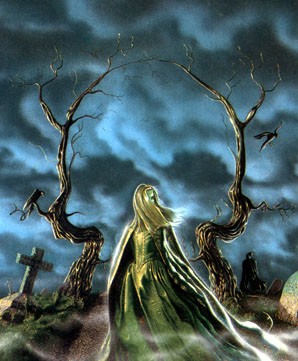

Some Quotes...

The Vampire
The English word vampire is derived from a wide range of similar-sounding
words such as the Hungarian vampir, Polish upior, and Russian wampira. In
addition, the Romanian word nosferatu, which means "undead," has become a
synonym for vampires. The etymology of these words reflects the fact that
most of the vampires with which we are familiar are descended from Eastern
European folk vampires.
Vlad the Impaler (1431-1476) is considered to be the original historical
Dracula that Bram Stoker used as a 'model' for his 1897 novel �Dracula�.
Vlad�s father, also known as Vlad, joined the Order of the Dragon shortly
after his son�s birth in Schassburg, Transylvania. The name 'Dracula' means
'son of Dracul', or son of the dragon or evil.
-G. Gordon Melton, The Vampire Book
The power of the vampire is very great and many-sided, even in his
lifetime can kill people and even eat them alive; can bring into being, or
remove, various sicknesses and epidemics, storms, rain, hail, and such; he
casts spells on cows and their milk, the crops and the husbandry generally;
he knows all secrets and future, ect. Because this he can make himself
invisible or transform himself into various objects, especially into animal
forms.
-a verse from Galician folklore

A very common belief, reported not only from eastern Europe but also from
China, holds that a person becomes a revenant when an animal jumps over him.
In Romania, there is a beliefe that a bat can transform a corpse into a
vampire by flying over it.
-Masters, Anthony. The Natural History of the Vampire
When vampires and revenants in European folklore suck blood--many do not--
they bite their victims somewhere on the thorax. Among the Kashubes, a
Slavic people of northern Europe, vampires chose the area of the left breast;
among the Russians, they left a small wound in the area of the ear; and in
Dazig (now Gdansk), they bit the victim�s nipples.
-Masters, Anthony. The Natural History of the Vampire
Vampires provided a perfect mirror of the worst fears of the pious and
perfect. Vampires were dangerous, sexually rampant, enormously powerful,
absolutely unconcerned about human dignity and preservation of the soul,
and finally...dead. And it was this last aspect of their nature that made
them the most fascinating to legend-makers.
-Dunn Mascetti, Manuela. Vampires: The Complete Guide to the World of the Undead
"The strength of the vampire is that people will not believe in him."
-Tod Browning






